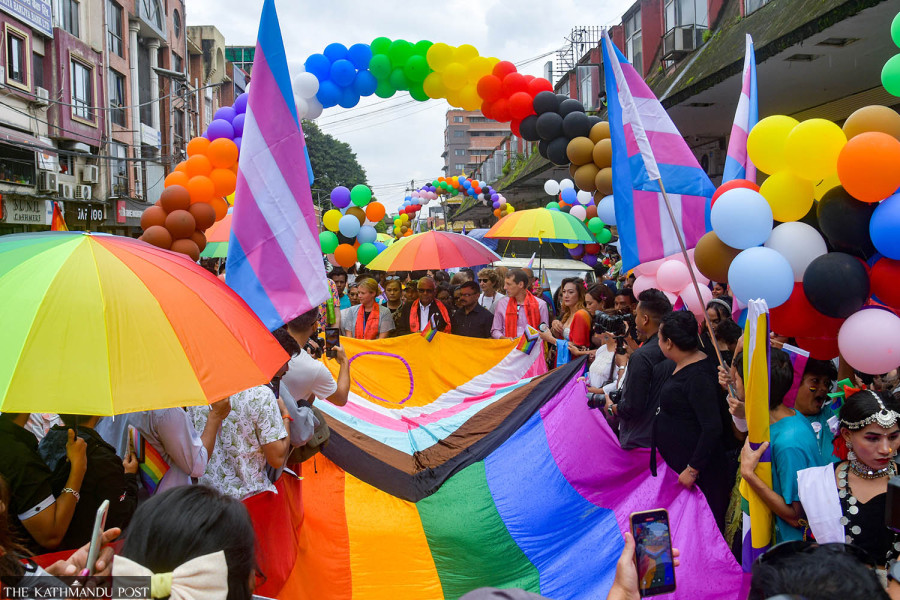National
For Nepali queer people, discrimination persists even after death
The 21st Nepal Pride Parade and Gaijatra Celebration 2024 honoured LGBTQIA+ members who passed away this year.
Aarati Ray
On Tuesday, as Kathmandu buzzed with the annual Gaijatra celebrations, a unique parade threaded through the city’s streets. Amid the usual parades for the deceased, one group stood out—not merely for their rainbow flags and balloons, but because this procession was not led by the family members of the departed souls it honoured. Instead, hundreds of strangers walked together, united by a shared struggle for acceptance in Nepal’s predominantly heteronormative society.
The 21st Nepal Pride Parade and Gaijatra Celebration 2024, organised by the Blue Diamond Society (BDS) in collaboration with ‘Right Here Right Now’, brought together LGBTQIA+ individuals from across Nepal.
The event began with a gathering in front of the Karmachari Sanchaya Kosh Building in Thamel culminating at Basantapur Dabali with a candle-lighting ceremony to honour LGBTQIA+ members who passed away this year.
Pinky Gurung, president of the BDS, explained that the Gaijatra and Pride Parade began in 2003 as a response to the loss of many BDS members. Since its founding in 2001, many members had passed away due to various causes, including health issues, grief, abandonment by their families, and even suicide.
Tragically, even in death, many of these individuals faced rejection, with their families refusing to perform the necessary funeral rites. In response, the organisation turned to the Newari tradition of Gaijatra, a festival where families commemorate their deceased loved ones.
This year’s parade commemorated three deceased members of the LGBTQIA+ community who had little to no family support for their funeral ceremonies and faced discrimination even in death.
Among them was Samoj, who the Post is identifying with a pseudonym for privacy reasons, a gender non-conforming individual who passed away at the age of 62 from cancer on March 18, 2024. BDS organised their entire funeral, as their family had abandoned them due to their identity.
“Even though times have changed, many LGBTQIA+ members still face abandonment from their families,” Gurung says. “Many still don’t have their families at their funerals. Only a few cases come to us, but there must be many others. This parade represents the commemoration of our deceased community members, so their souls can rest in peace.”
She added, “In Gaijatra, men dress as women in brocade crimson blouses and sarees, so in a way, Gaijatra has always embodied and embraced the LGBTQIA+ community.”
For Subhash Paudel, a participant who travelled from Sudurpaschim to attend the parade, the event provided a sense of belonging. “I came here from Kailali just to participate in the parade,” Paudel said. “Even if no one else supports us, we will always be there for each other.”
This reality was deeply felt by Kedar (name changed for privacy), a 19-year-old participant from Bhaktapur who hasn’t yet come out to his family. “I don’t know how my family will react when they find out,” he said.
He’s witnessed many cases where children were abandoned upon revealing their identity. Having seen cases like Samoj’s, he is anxious at the thought that his own family might not acknowledge him in death. “It breaks my heart to think that if I were to die, my family might not even come to see me one last time,” Kedar said. “But events like these reassure me that at least someone will be there for us… If death is supposed to end all enmities, why does discrimination against our community persist even after we’re gone?”
This question reflects a bitter truth—despite legal advances, deep-rooted discrimination persists for Nepal’s LGBTQIA+ community, even in death.
Studies have shown that socially excluded populations, including LGBTQIA+ individuals, often have poorer access to healthcare and are at higher risk of certain life-threatening illnesses.
Yet, evidence suggests they may not receive the care and support they need at the end of life. Discrimination from healthcare providers, fear of prejudice in bereavement, and the erasure of their relationships compound their struggles, leading to what is known as “disenfranchised grief”—a grief unacknowledged by society due to non-normative relationships.
A joint report by Stonewall and Co-operative FuneralCare in the UK revealed that gay, lesbian, and bisexual people often fear discrimination when arranging funerals. One in ten respondents reported experiencing prejudice firsthand following the death of a loved one, mostly at the hands of family members and religious leaders.
Although this study is not specific to Nepal, the experiences resonate within the Nepali LGBTQIA+ community.
Take the case of Sukmaya Magar, a 55-year-old lesbian woman from Tanahun’s Devghat. When her partner died in 2020, Sukmaya found herself stripped of the life they had built together. As her partner’s elder sister claimed their shared property, Sukmaya, who was not legally recognised as her partner’s spouse, was left with nothing. She couldn’t access her partner’s bank account to cover medical expenses.
Sukmaya didn’t even have enough money for the funeral rites of her partner and the priest had shown prejudices against her, calling their relationship a ‘sin’. Later, her partner’s family had taken charge of the funeral ceremony, barring Sukmaya from participating in it.
Such stories of exclusion and prejudice are too common among Nepal’s LGBTQIA+ community. In the last three years, BDS has supported the funeral ceremonies of six LGBTQIA+ individuals whose families had been reluctant to do so.
“Next time I participate in Gaijatra, I hope we will be commemorating the deceased members of our community as a mark of respect and for their peaceful rest, not because they had no one to hold a funeral in their last moments,” said Biswas Raut, another participant from Sudurpaschim. “I hope families can be more accepting.”
As the candles flickered in the twilight at Basantapur Dabali, the message was clear. The struggle for acceptance, it seems, does not end with life but continues beyond.




 8.79°C Kathmandu
8.79°C Kathmandu















